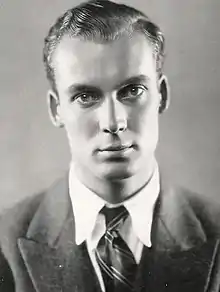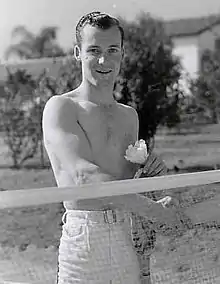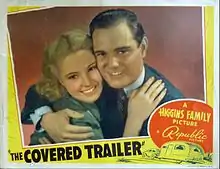Russell Gleason | |
|---|---|
 Gleason in 1931 | |
| Born | February 6, 1908 Portland, Oregon, U.S. |
| Died | December 25, 1945 (aged 37) New York City, U.S. |
| Resting place | Long Island National Cemetery, New York, U.S.[1] 40°45′04″N 73°23′55″W / 40.7511°N 73.3985°W |
| Occupation | Actor |
| Years active | 1929–1944 |
| Height | 6 ft 0 in (1.83 m)[2] |
| Spouse |
Cynthia Lindsay (m. 1938) |
| Children | 1 |
| Parent(s) | James Gleason Lucile Gleason |
Russell Gleason (February 6, 1908 – December 25, 1945)[lower-alpha 1] was an American actor who began his career at the very beginning of the talking film era. He was born into an acting family, the son of actors Lucille and James Gleason. He had an early screen role in the 1930 film All Quiet on the Western Front.
While still in the middle of a successful acting career, Gleason joined the U.S. Army in late 1943, during World War II. While awaiting deployment to Europe in December 1945 in New York City, Gleason fell to his death from a hotel window.
Early life
Gleason was born to actors Lucile (née Webster) and James Gleason on February 6, 1908, in Portland, Oregon, where his parents were acting in local theater productions.[6] As a child, Gleason appeared on stage in some of the theatrical productions put on by his parents. His debut occurred when he was carried on stage by his grandmother to appear with his mother in The Heir to the Hooray. Growing up, he lived with his maternal grandmother in Oakland, California. During school years, he rarely saw his parents, but he acted with them in stock theater during summer vacations.[7]
Career
Gleason's first foray into film was when he was 21, with a leading role in 1929's The Shady Lady, directed by Edward H. Griffith.[8] The following year he had a critical success in his role of Private Mueller in the Oscar-winning film, All Quiet on the Western Front. His short career only spanned 15 years, during which time he appeared in over 50 feature films, mostly in featured or starring roles.[9] He appeared with both of his parents in the film series surrounding The Higgins Family, of which nine films were made from 1938 to 1941. The Gleasons appeared in seven of those films, the last one being Grandpa Goes to Town in 1940 (the last two "Higgins" films were made with other actors).[10] He would also appear in "The Jones Family" series, produced by 20th Century Fox.
After making his last film, The Adventures of Mark Twain, which finished production in September 1942, he joined the Army. His final four pictures would all be released in 1944, after he was already in the service.
Personal life

Early in his career, he was romantically linked with Mary Brian.[11] Gleason was married to Cynthia Hobart (later Cynthia Lindsay), who was a stunt woman and swimmer, and later wrote a biography of Boris Karloff. The entire Gleason family were close friends with Karloff, and the young couple became the godparents to Karloff's daughter, Sara Jane.[12][13] Hobart also co-wrote George Burns' autobiography with the actor.[14] The Gleasons had a son, Michael, on June 1, 1939. After Russell Gleason's death, Cynthia remarried, to Lou Lindsay, and Michael took his step-father's last name, and went on to become a television producer.[15]
Death
On December 25, 1945, Gleason was in New York City awaiting deployment to Europe with his regiment when he fell to his death out of a fourth story window in the Hotel Sutton on East 56th Street in Manhattan, which the army had commandeered to house the troops. Law enforcement was unable to determine whether Gleason's fall from the window had been accidental or a suicide.[16] It had been reported in some publications, such as Variety, that Gleason had been prescribed a sulfonamide to treat a cold at the time, and that the drug had resulted in grogginess that led him to accidentally falling.[17]
He was interred at the Long Island National Cemetery, a military cemetery, on December 28, 1945.[1]
Filmography

| Year | Title | Role | Notes |
|---|---|---|---|
| 1928 | The Shady Lady | Haley | |
| 1929 | The Flying Fool | Jimmy Taylor | |
| 1929 | Seven Faces | Georges Dufeyel | |
| 1929 | The Sophomore | Dutch | |
| 1929 | Strange Cargo | Hungerford | |
| 1930 | All Quiet on the Western Front | Private Müller | |
| 1930 | Officer O'Brien | Johnny Dale | |
| 1930 | Sisters | Eddie | |
| 1931 | Beyond Victory | Russell "Bud" | |
| 1931 | The Homicide Squad | Joe Riley | |
| 1931 | Laugh and Get Rich | Larry Owens | |
| 1931 | Nice Women | Billy Wells | |
| 1932 | The Strange Case of Clara Deane | Norman Ware | |
| 1933 | Private Jones | Williams | |
| 1934 | I Can't Escape | Tom Martin | |
| 1935 | Hot Tip | Ben Johnson | |
| 1935 | Condemned to Live | David | |
| 1936 | Hitch Hike to Heaven | Daniel Delaney | |
| 1936 | A Tenderfoot Goes West | Pike | |
| 1937 | The Jones Family in Big Business | Herbert Thompson | |
| 1937 | Off to the Races | Herbert Thompson | |
| 1937 | Borrowing Trouble | Herbert Thompson | |
| 1937 | Hot Water | Herbert Thompson | |
| 1938 | Fury Below | Jim Cole, 3rd | |
| 1938 | The Higgins Family | Sidney Higgins (first of a series) | |
| 1938 | A Trip to Paris | Herbert Thompson | |
| 1938 | Safety in Numbers | Herbert Thompson | |
| 1938 | Love on a Budget | Herbert Thompson | |
| 1938 | Down on the Farm | Herbert Thompson | |
| 1939 | Should Husbands Work? | Sidney Higgins | |
| 1939 | My Wife's Relatives | Sidney Higgins | |
| 1939 | Here I Am a Stranger | Tom Sortwell | |
| 1939 | Undercover Agent | William Trent | |
| 1939 | Everybody's Baby | Herbert Thompson | |
| 1939 | The Covered Trailer | Sidney Higgins | |
| 1939 | News Is Made at Night | Albert Hockman | |
| 1939 | Money to Burn | Sidney Higgins | |
| 1940 | Earl of Puddlestone | Sidney Higgins | |
| 1940 | Grandpa Goes to Town | Sidney Higgins | |
| 1940 | Yesterday's Heroes | Bill Garrett | |
| 1940 | Young as You Feel | Herbert Thompson | |
| 1941 | Unexpected Uncle | Tommy Turner | |
| 1942 | Dudes Are Pretty People | Brad | |
| 1942 | Fingers at the Window | Ogilvie | |
| 1943 | Salute to the Marines | Private Hanks | |
| 1943 | Swing Shift Maisie | Inspector | |
| 1943 | Three Hearts for Julia | Jones | |
| 1943 | Seeing Hands (Short film) | Ben Helwig | Film nominated for an Academy Award for Best Short Subject, One-reel |
| 1944 | Lost Angel | Reporter | |
| 1944 | Swing Fever | Sergeant | |
| 1944 | Meet the People | Bill | |
| 1944 | The Adventures of Mark Twain | Orion Clemens | |
Notes
- ↑ Sources differ on both Gleason's birth year as well as his date of death:
- The AllMovie Guide as well as several others state he was born in 1908. This is corroborated by New York City Municipal Death records.[1] Some sources, however, such as David K. Frasier's Suicide in the Entertainment Industry (2002)[3] allege his birth year to be 1907. The official New York City Municipal Death records corroborate his birth year as 1908, as do his U.S. army enlistment records from November 1943 in Los Angeles.[4]
- Some sources[3] claim Gleason died December 26, 1945; however, the official New York City Municipal Death records list his death date as December 25, and his burial date as December 28, 1945. His death was also reported to be December 25 in a January 1946 issue of Billboard.[5]
References
- 1 2 3 "New York, New York City Municipal Deaths, 1795-1949," database, FamilySearch (20 March 2015), Russell W. Gleason, 25 Dec 1945; citing Death, Manhattan, New York, New York, United States, New York Municipal Archives, New York; FHL microfilm 2,132,816.
- ↑ What Actors Eat--when They Eat. Lymanhouse. 1939. p. 101.
- 1 2 Frasier, David K. (2002). Suicide in the Entertainment Industry: An Encyclopedia of 840 Twentieth Century Cases. McFarland. p. 120. ISBN 978-0-786-41038-5.
- ↑ "United States World War II Army Enlistment Records, 1938-1946," database, FamilySearch (5 December 2014), Russell W Gleason, enlisted 29 Nov 1943, Los Angeles, California, United States; citing "Electronic Army Serial Number Merged File, ca. 1938-1946," database, The National Archives: Access to Archival Databases (AAD) (https://aad.archives.gov : National Archives and Records Administration, 2002); NARA NAID 126323, National Archives at College Park, Maryland.
- ↑ "The Final Curtain". Billboard. January 5, 1946. p. 64 – via Google Books.
- ↑ Schilling, Lester Lorenzo (1961). The History of the Theatre in Portland, Oregon, 1846-1949. Vol. 2. University of Wisconsin Press. pp. 355–7.
- ↑ Wagner, Laura (Summer 2017). "Russell Gleason: In His Father's Shadow". Films of the Golden Age (89): 55–57.
- ↑ "The Shady Lady: Detail View". American Film Institute. Retrieved October 22, 2014.
- 1 2 "Russell Gleason". American Film Institute. Retrieved October 22, 2014.
- ↑ "The Higgins Family: Notes". Turner Classic Movies. Archived from the original on October 23, 2014. Retrieved October 22, 2014.
- ↑ Slide, Anthony (2010). Silent Players. Lexington, Kentucky: University Press of Kentucky. p. 43. ISBN 978-0813137452.
- ↑ Nollen, Scott Allen (2013). Boris Karloff: A Gentleman's Life. Baltimore, Maryland: Midnight Marquee & BearManor Media. ISBN 978-1887664233.
- ↑ Lindsey, Cynthia (2004). Dear Boris: The Life of William Henry Pratt a.k.a. Boris Karloff. Limelight. ISBN 1887664238.
- ↑ Burns, George; Hobart Lindsey, Cynthia (2016). I Love Her, That's Why!: An Autobiography. CreateSpace Independent Publishing. ISBN 978-1523200917.
- ↑ Heritage Auctions Music and Entertainment Auction Catalog #696. Heritage Capital Corporation. 2008. p. 23. ISBN 978-1599672885.
- ↑ Liebman, Roy (2017). Broadway Actors in Films, 1894-2015. McFarland. p. 109. ISBN 978-0-786-47685-5.
- ↑ Senn, Bryan (2006). Golden Horrors: An Illustrated Critical Filmography of Terror Cinema, 1931-1939. McFarland. p. 327. ISBN 978-0-786-42724-6.